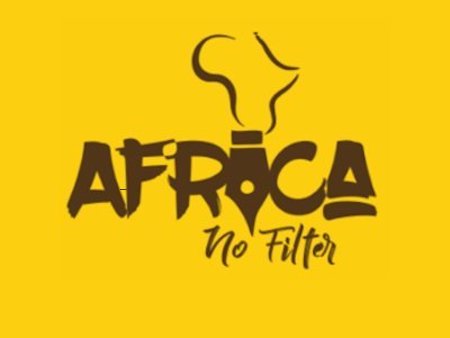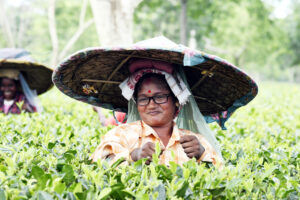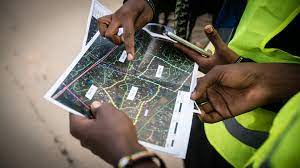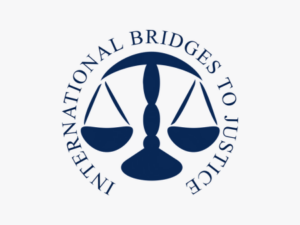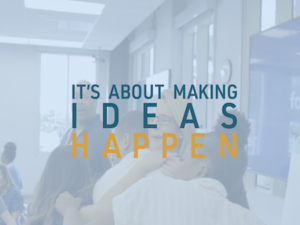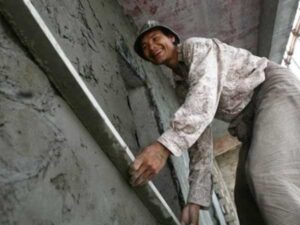Africa No Filter supports storytellers and organizations countering stereotypical and harmful narratives about the African continent.
Moky Makura of Africa No Filter spoke with Lissa Harris on April 14, 2023. Click here to read the full conversation with insights highlighted.
Lissa Harris: Could you please start by introducing yourself and your organization, and tell me a little bit about the problem that you’re working on?
Moky Makura: My name is Moky Makura, and I’m the executive director of an organization called Africa No Filter. We are what you call a donor collaborative because seven funders came together for this shared, ambitious, lofty mission, which was to shift some of the harmful and stereotypical narratives that persist about the continent, about Africa. The importance of the work is that for many years, many philanthropies and many funders have been pouring money into the continent. And often, the stories that they hear back are the same stories they’ve been trying to fix, that there seems to be no progress. That Africa is a broken continent. That we lack agency and nothing works. That it’s corrupt. So, that’s what we’re working on. We’re working on trying to change those narratives and to do that, you have to change the underlying stories, so that’s what we do.
Lissa Harris: Who are the beneficiaries of your work? Can you talk about who benefits and how from the work that you do?
Moky Makura: I think it’s clear because the people who are most affected by poor narratives about Africa are Africans. The beneficiaries of our work are Africans. That means Africans in the diaspora, and perhaps the ones who probably feel the impact of this broken continent narrative are the Africans who are living in the diaspora.
At the end of the day, I feel that there is an impact to this narrative in four different places. One, the narratives affect the way funders and donors engage with Africans, this perception that we’re broken and we need them. It leads to an unequal balance of power. The second is that it affects investment and business on the continent. I always argue that somebody like Bill Gates probably spent more philanthropic dollars in Africa than he has personal investments because of the perception that there is no return on investment. The third one is that this narrative impacts how the world views Africa. I have numerous examples of bad impact on a day-to-day basis. And one that was very sort of pertinent to me was the fact that I took a vaccine for COVID in Africa and I tried to get into Europe, and I was told that my vaccine was not recognized, even though it was. The fact that I got it in Africa meant it couldn’t possibly work, or maybe I didn’t even have one at all. That’s the impact of the narrative on day-to-day Africans.
Finally, I think the biggest issue that we work on is the impact of that narrative on how we, as Africans, see ourselves. It’s the reason why people leave for Europe. A couple of weeks ago, 29 people drowned trying to get to Europe because they believed in the European dream and the American dream. They don’t believe in the African dream, and I actually think it’s a failure of storytelling. We failed to tell those stories of hope. We failed to tell the good news stories that inspire hope, and that’s what our work is.
Lissa Harris: Can you talk a little bit more specifically, in practical terms, how are you working to change this narrative? Who are you working with and how are you trying to shift those levers?
Moky Makura: The only way to change a narrative is to change the stories that feed it. Narratives evolve through stories told persistently over time, so we work with storytellers in the media, and in the arts and culture space. If you are a visual artist or a writer, even a graphic writer or an illustrator, you tell your story through different mediums, so we consider arts and culture. The third category for us are content creators on social media who aren’t quite journalists, but they’re also not quite artists. Those are the categories of storytellers that we work with.
Lissa Harris: How do you amplify their voices? How do you get them placed in positions where those stories are going to spread farther?
Moky Makura: We don’t amplify directly. Instead, we’re trying to build a community. We’re trying to grow a field of people who care about the narrative about Africa. Not every writer does, not every journalist does, not every content creator does, but there are some that do. We’re trying to build a community, I call it an army of people who genuinely care what the narrative is and care how people see their country, their community, or their continent. The first thing we do is we’re building community, and by that, we’re trying to amplify their work. We network them with each other and connect them to markets, so that they become sustainable as storytellers because that’s another big issue. We also try to build their capacity and uplift them in some way.
The second thing we do is that we are a grant maker. We give out about a million dollars in grants every year to two storytellers. We do two types of grants. One is a content grant to get more content that’s positive, or less negative. We also give grants that are about operational support, to help organizations that are doing great work.
We also do advocacy. Our big advocacy push really is around trying to get better representation for Africa in global spaces. We advocate for better stories. Let’s hear the more positive stories that often get overlooked, and also the difficult stories, because there will always be difficult stories. We’re not a PR campaign for the continent. We’re not saying there’s never anything bad that happens here. All we say is try and tell those stories a little bit better. Don’t make corruption or conflict the hero of that story because often it’s not. By default, we tend to make the hero the brokenness and we’re saying, let’s reframe. Let’s learn about framing, let’s learn about narrative.
The last thing we do is research. We’ve done quite interesting research about how African media covers Africa. We’ve got an interesting research project coming about how world leaders talk about Africa, what do they actually say? What are the words they use? Are they positive? Are they negative? Are they perpetuating the stereotypes? There’s a lot of interesting things we’re working on in those four buckets of work that we do.
Lissa Harris: How much of your work and your focus looks at how Africans talk to themselves about themselves, and how much of it is focused on how the world talks about and looks at Africa?
Moky Makura: I think it’s a really good point, and one of the things I said earlier on with the reports, one of the research reports we did was how African media covers Africa, so we do also look at ourselves. The other day I gave a talk to a big group of Africans, there were about 700 people from 50 different countries, and I talked about the importance of us telling our own stories, and also being aware of the narrative we’re feeding.
A lot of our advocacy is not necessarily going to people outside the continent, it’s going to our storytellers and our filmmakers to say, “Is this the narrative you want to put out there? Is this the hero that you want to highlight for the world? What is your story really about?” Like I said, we’re trying to advocate for better stories and stories told better, and that’s to any storyteller, not just other people and outsiders. In the case of global media for example, it’s far more influential than local media so we tackle it from a dual-perspective. I think for us, the focus is let’s start with ourselves, let us change the stories and highlight the positive, and it will move up the ladder.
Lissa Harris: I’m curious too about that tension. Like you said, you’re not a PR agency, you’re not here to just push good news, but there’s a tension there between wanting to shift the narrative away from dwelling on how broken things are or making that the hero of the story. How do you deal with that tension in the work?
Moky Makura: To be honest, it’s a great question, but I don’t see it as a tension because we’re not asking people not to tell those stories. For example, solutions journalism, reframing the story you’re telling to a solution lens as opposed to a problem lens. With development, it’s always like, this is a problem we’re trying to fix in Africa. No one ever talks about the huge amount of money that’s gone into that same problem, and what progress they’ve made.
I’ll give you a quick example because it helps people understand. Last year or the year before, there was a big protest in Nigeria where young people took to the streets and they were protesting against police brutality in Nigeria. A lot of the media coverage looked at it as if Nigeria was descending into chaos and Nigerian leaders were killing the young people, because some people died. It was a typical story of conflict, poor leadership and everything that was wrong. But in that same story, there was a story there of young people having agency to create change. It’s the same story, but you tell it from a different lens.
If you think about all those stories, remember Occupy Hong Kong? When I read those stories, it was like, “Yeah, these young people are going out there and making a difference.” It’s the same story. They told it a different way in Hong Kong, but somehow in Africa, that whole narrative of a broken continent just seeps into everything, it’s kind of a lazy way of writing the story because we’re used to it, and everybody almost expects it. I feel what we challenge journalists to do is think a little bit about how else they can tell this story. We’re not asking you to change the facts, we’re asking you to pop a different lens into your camera and look at it from a different lens.
Lissa Harris: What makes your approach distinctive from other groups that are working on similar problems?
Moky Makura: I think that no matter what you do in terms of development and how you try to change things, if people’s thinking about that problem doesn’t shift, if people’s understanding of what that problem is doesn’t shift fundamentally, there is nothing you can do to actually fix the problem in reality. What I’m saying is that if you are working on, I don’t know, sexual reproductive health, and you want women to take more contraceptives or to be in control of their bodies, if the stories they persistently hear continues to be about the fact that contraception is no good, you need to have multiple children. If the stories counter whatever it is you’re going to do, there is nothing you can do to change behavior, to achieve your goals. You’re trying to change a system, you’re trying to change behavior, but it’s so important that the stories that people hear work.
I feel that storytelling is at the core of so much of development work. People talk about it, but very few people do it well. Even in this forum, I’ve seen a lot of people stand up and say, “One in 200 women die giving birth.” What about the 199 who made it? What did they get right? Again, why are you giving me that fact? Are you trying to scare me? You’re trying to tell me that there needs to be change, but you can also tell me that we don’t want to lose that one woman who dies and we’re really pleased about the 199. Here is how we achieved that, how we got those 199 through childbirth. I just feel there’s more sense of hope, because with hope you can have change. Without hope, there’s no change.
Lissa Harris: Is there a specific story or example that you can talk about that illustrates the impact of your work?
Moky Makura: I can give you two examples. One, I said I did this talk in front of 700 young people, and I talked about the importance of storytelling and the need to tell stories better. At the end, a number of people said to me, “You know what? After listening to you, I’m going to be more careful about how I speak about my country.” That for me, is all I want. Even if one person says, “You know what? I’m not going to run down my country because I’m aware of the impact of narrative. Narrative matters. Stories matter.”
The other thing for me is that we have created a story agency, it’s a news agency like Reuters, it’s called Bird, where every day we put out two stories that are narrative changing. They’re not good news stories, because a lot of people think good news stories are all about fluffy cats. These are stories of everyday progress. Some are data stories, some are human interest, and the number of times people come up to me and say, “Wow, this is really good. I’m so happy to see that somebody is doing this.” That for me, is impact, because we talk about the importance of stories, but we’re actually generating two new stories. We can only change the narrative one story at a time. I really wish I had one of these big clocks that’s counting down. Today there’s another story. Tomorrow there’s another story. In 10 years time, we’ve done millions of stories. And maybe, just maybe, we would have been successful in changing the narrative.
Lissa Harris: Could you talk a little bit about the lessons that other people could draw from the work that you do? What advice would you give people who want to do something like what you’re doing, maybe in another context?
Moky Makura: I feel there are two things. One is that creatives, storytellers, are an important part of development, and not just from a transactional perspective. People think, “We’re going to pay this journalist. We’re going to train them on this particular issue, and we’re going to set them free to write.” That’s great, that’s transactional. But who is making sure those journalists are there? Who’s making sure the arts and culture industry is sustainable? Who’s making sure content creators are there? Very few funders are doing that.
I have a big ambition to have more funders funding the arts in Africa, funding media in Africa and across the world. Without them, social change really doesn’t happen. For example, when you look at the LGBTQI sector, they become so vocal, and a lot of that was through pop culture. When I think about how I learned about LGBTQI, it was through the series Will & Grace. That’s creative. A script writer wrote that and somebody put that on television, and then it normalized things. That’s kind of what we’re saying, that the creative industry – artists, writers – we need to support them because without them, social change just won’t happen.
Lissa Harris: How do you measure success and what evidence do you track to see progress?
Moky Makura: This is one of the most challenging questions for anybody who’s doing this work. How do you measure success or how do you measure impact? It basically boils down to what we think success is for us. In a way, we work through intermediaries. Our intermediaries are the storytellers, so we’re working through a bunch of people. For me, success would be every time I make a writer or a journalist or a filmmaker conscious of the narrative, that for me is success because one less story, one less film that feeds the narrative makes me think we’re doing a great job.
Generally, in terms of our ultimate beneficiaries, it’s about people. When I ask people, “When I say Africa or when I say Eritrea, or Somalia, or Mali, what are the words that come to your mind?” Nine times out of 10, it’s always negative. Success to me is if I ask a non-African that question and they come up with something that’s not necessarily negative. I don’t necessarily want something positive, what I want is a multiplicity of narratives.
Lissa Harris: Yes, it’s not very three-dimensional. It’s not a picture of a full human society. It’s a very flat picture.
Moky Makura: Exactly. When I ask that question, I want people to think it’s a multiplicity of narratives. That would be a success to me.
Lissa Harris: Sometimes we learn as much from things that don’t work as things that do. Is there something that you tried that didn’t work that you learned an important lesson from?
Moky Makura: My strong belief is that philanthropy is all about risk taking, so we try lots of different things. One of the things that we did do a lot of and now we’re not doing so much, was that there is a perception that the only way to get money out of people is by knowing somebody. We put all of our call-outs on social media so, if you have a social media account and you are able to follow us, you can potentially apply for funding. The downside of that is we got tons and tons of applications, that were probably not correct and not that good, and some people who weren’t interested in narrative change, they just wanted the money.
We have learned to use our networks, and we’re working really hard to grow the network so that it’s not so exclusive. We’re looking for people who are passionate and committed and already doing this work that’s shifting narratives, and there are tons of them. The work is on us, whereas before we were sitting back thinking people should apply to the application that’s on social media. That was a big lesson for us, but it doesn’t mean we’re not doing it. Maybe 10% of the applications will come from that, but 90% is us doing the work to find the people that we want to support.
Lissa Harris: What do you see as the broad challenges to your work, the problems that you really haven’t yet been able to overcome or solve, kind of big picture problems you still need to solve?
Moky Makura: It’s an issue of funding. We’re not going to get funded forever, everybody faces that, but I feel that what’s on the good side, which is the opposite of the question you asked me, is that there’s never been a better time for this work right now. There is so much awareness and there’s so much sensitivity to representing people and inclusiveness. This is our time. There’s no major thing standing in our way. It’s a matter of just being there, changing stories, doing it digitally and being patient.
Lissa Harris: Is there anything more you want to say about how you’re working to advance systems-level change? What are your methods for really changing that narrative?
Moky Makura: Our theory of change is that the only way to do stuff is one story at a time. Under our advocacy campaign for better representation, we are trying to get media houses to think about representation in the newsroom. That is system-level change, because you know what? If you have a white middle-aged male editor, he’s going to want a particular type of story. We’re talking about representation in the newsroom, in global media outlets. Little local newspapers don’t need to have global representation because they’re not trying to put out global stories but global outlets who say they’re covering the world should have that representation in key places, senior places in their newsroom.
To be honest, systemic change for me is difficult to pinpoint and target. I think if you’re clear about your mission, you need to be clear about the little steps. Like eating an elephant, somebody says, “How are you going to eat that elephant?” One step at a time. For us, it is just one story at a time, and we can do it. The platforms are there, the Netflixes are there and they’re putting out content. There’s never been a better time. We just need to do it.
Lissa Harris: What do you think is most needed from other actors in this space, particularly media outlets, your partners and other people in this space, to advance change?
Moky Makura: There’s never anywhere where I talk about this that people say, “Nah, it’s not going to work,” or, “There’s no need for this.” I think we’ve got the support we need in spirit in kind, maybe not always in cash. And again, with anything, you need money to support it. I don’t want to say that everything’s hunky-dory and roses. But it’s like Black Lives matter. Who the hell’s going to stand in the way of that and be public about it? It’s just one of these things that you know needs to be done. It’s a case of where in the hierarchy of needs you put it, but you believe it’s important work. There’s nobody that’s working on the content that doesn’t believe that the narrative does need to change. Africa has made progress, and we just need to make sure that’s reflected in the stories that come out.
Lissa Harris: How do you see your work evolving and shifting over the next five years?
Moky Makura: We will become much more of an advocacy organization rather than a grant-making organization. I see us devolving ownership of this mission to this community. I’ll use the LGBTQI example, there’s no major organization that now owns it. Anybody can challenge because they have that ability to challenge. You don’t need an organization behind you. That’s what I want people to be able to say. “You know what? I’m an African. I find that story offensive. I find that framing offensive because that’s not the Africa I know.” That’s how I see our organization empowering people. It’s not about Africa No Filter or really good funders, because we are a good funder, but I don’t see us being around forever, and I don’t think we should be. We’re a moment in time. We’re needed now. In 10 years time, if I’m still doing this work, I think we failed.
Lissa Harris: Thank you so much for talking with me today.
Click here to read the full conversation with insights highlighted.
Lissa Harris is a freelance reporter and science writer (MIT ’08) based in the Catskills of upstate New York. She currently writes about climate, energy, and environment issues from a local perspective for the Albany Times Union, her own Substack newsletter, and various other digital and print publications.
* This interview has been edited and condensed.
Read insights from what’s working in social innovation.

